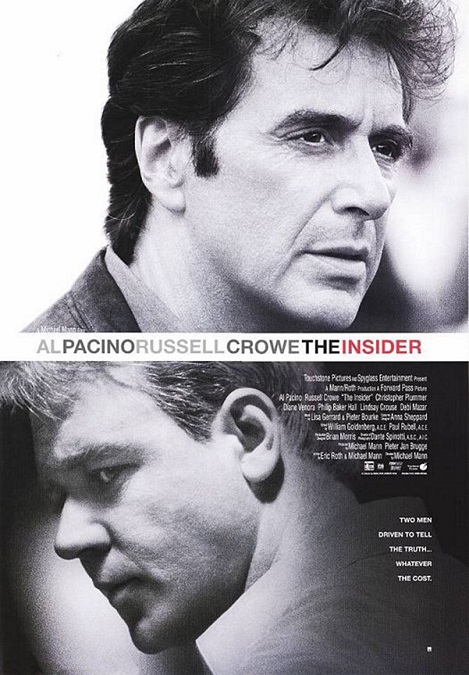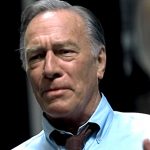
The Insider – 1999
This was a good enough movie, but not as good as I was hoping it would be. Despite this, I have to give Russell Crowe’s performance two thumbs up. He really created a great character. He was the common man who gets pushed up against a wall and is willing to risk everything he has to fight back. True, he loses it all, but he does it while standing on the moral high-ground. The question is, is it worth it?
Crowe plays Jeffrey Wigand, the man who blew the whistle on the tobacco industry. Al Pacino played Lowell Bergman, the 60 Minutes journalist who got him to do it. The two actors had a good on-screen chemistry, but Crowe’s performance was much more memorable than Pacino’s. Why? First, the character was just more visually memorable. Crowe put on thirty-five pounds and dyed his hair white in order to emulate the real Wigand. Second, the character was more pivotal to the story. And lastly, I think his performance was infinitely more intense than Pacino’s.
Russell Crowe really did a fantastic job and earned himself a Best Actor nomination. He played it all perfectly, from the initial nervousness of a man who is walking around the edge of breaking the law, to the seriousness of self-endangering intent. His emotions were always so clear, and yet somehow always subtle at the same time. It was really an Oscar-worthy performance. Well done, Russell.
Pacino did just fine, but his performance was nowhere near the level of some of his previous films like Scent of a Woman or The Godfather. Also, this is not the kind of role we are used to seeing Pacino in. I applaud him for wanting to do something that was outside his normal comfort zone, but there was a bit of a disconnect in my head which made it an effort to believe in the honesty of his portrayal. This was in no way Pacino’s fault. It is my issue in how I perceived his performance. Really, he did alright, though nothing to write home about.
The movie actually followed Bergman as the lead role. It began with him and followed his relationship with Wigand, his efforts to encourage him and then to protect him once the tobacco companies started to intimidate him and his family, even going so far as to send death threats if he went public with what he knew. And the plot continued to follow Bergman after Wigand’s wife, Deborah, played by Renee Olstead, had left him and taken his kids away from him. Bergman stayed and made sure that all his efforts were not in vain, fighting against CBS, his show’s network who caved in to the money machine of the tobacco companies, refusing to air Wigand’s deposition. Even the final few scenes in the movie followed Bergman in the aftermath of the pivotal events, not Wigand.
And what was it that Wigand knew that was so dangerous to the tobacco industry? First of all it is important to understand that tobacco is a multi-billion dollar industry. They have never lost a law suit because they can out-money anyone who tries to sue them. They use incredibly strong and threatening intimidation tactics to scare anyone who dares to oppose them. And the CEOs of the 7 largest tobacco companies had been video-taped in court, swearing that there was no evidence that smoking caused any detrimental health issues. This was a bald-faced lie, a fact of which Wigand was fully aware, having been the Vice President of Research and Development at Brown & Williamson, one of those big tobacco companies.
Wigand knew that not only were the companies aware that their products were both addictive and harmful, but that the companies added chemicals to their cigarettes to make them even more habit-forming and dangerous. In the end, Wigand’s knowledge of the lie made him dangerous, and he felt compelled to go public with his knowledge, even going so far as to break his signed confidentiality agreement to do so. But it wasn’t his concern for public health or safety that motivated him. It was the very fact that his former employer was trying to pressure him to stay silent.
Unfortunately, the film is somewhat unremarkable. The subject matter just wasn’t very intense. The best part of the film is Crowe’s performance. From what I have read, the movie stayed pretty accurate to the real events which took place in 1996. Before the ending credits began to roll, some text was put up on the screen, explaining what happened to the characters, and that Wigand’s testimony resulted in the tobacco industry losing around a total of $246 billion in law suits. It also made a point of saying, “Although based on a true story, certain events in this motion picture have been fictionalized for dramatic effect.”
What this means is that, according to Mike Wallace, the real Bergman’s long-time co-worker at 60 Minutes, played in the movie by Christopher Plummer, two-thirds of the movie is accurate but that he disagreed with how his own motivations were changed for the film, casting him in a more negative light. So, if the subject of corporate whistle-blowing interest you, then this is a good movie to see. Other than that, you might be enticed by Crowe’s exceptional performance. But if not for those two things, this was a fairly unremarkable movie.








